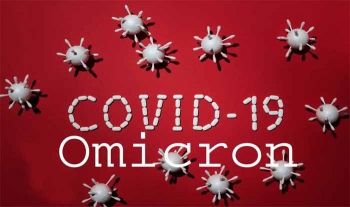
.png) Julian S Das
Julian S Das

Even since the new variant of the coronavirus has been identified in South Africa, named Omicron by the World Health Organization (WHO), there had been a spur in pharmaceutical companies to be the first one to come up with a vaccine, or a booster to combat the new ‘deadly’ variant.
There had been red alert announced across the globe, to nab the virus and blow a death-knell to it by not allowing its entry into countries; tourism sector, which had seen some of the worst days in human history, is now on the verge of collapsing, thanks to the hasty and faulty decisions made by technically unsound or mostly illiterate politicians.
Scientifically known as B. 1. 1. 529, the new variant has been reported by South African officials on November 24. The variant is dubbed by the WHO as “a variant of concern”, thus alerting the world community to debar entrants from South Africa into any country.
Already by November 29, the variant seemed to have been detected in at least 15 countries of the five continents through passengers who had travelled out of South Africa. The officials of South Africa also informed that most of the people who were infected with the new variant were unvaccinated.
Welcome to a world of making some quick money in the name of responding to the time and tide, which as the proverb goes, wait for no one. Coronavirus has been a blessing in disguise to a section of our society, but a curse for millions of hapless victims of our fractured structures, unequal systems, law-makers who cannot see beyond the tip of their noses, and crony business people, for whom money matters more than the wellbeing of humanity.
The world seems to be reeling under temporary amnesia, even as it tries hard to combat a situation which had never happened before in human history, at least not in the way it had affected literally every person under the sun. It is hard to know which information is scientifically based, and which come out of conjectures and convenience of unscientific minds.
We often believe what our national leaders say about the reality looming large before us, but now we know that the leaders have perhaps the least scientific data when they begin discussion about possible solutions to major problems rocking the country or the global community. Thus we, most often, are led to believe either that we as a race are on the verge of extinction, or that we do not need to worry, as things are within our control.
As soon as the WHO declared the identification of Omicron, most nations had put a ban on people travelling in or out of South Africa, which felt that it was penalized for identifying the variant, instead of appreciating its concern for the world.
The Union Health Minister Mansukh Mandaviya told the Rajya Sabha on November 30 that there was no case of Omicron variant detected in India, and the Covid situation was under control.
But one wonders if the world leaders are far too cautious of the new variant, which is declared in India as the third wave, and if the general travel ban across the globe can contain the new variant from affecting the lives of aam aadmi. Would a balanced and studied approach have been better?
Opening to Mint Money
Pharmaceutical companies should be celebrating the identification of Omicron, because they have yet another variant for which they can come up with a vaccine or at least a booster, so that they could boost their financial gains.
It is said that both Pfizer and Moderna, two pharmaceutical giants, have said that if the new variant is more resistant to their vaccines than the former variants, then they could develop and ship a modified vaccine within about 100 days.
For Pfizer and Moderna, not to forget our own Bharat BioTech and Serum Institute of India which came up with Covaxin and Covishield respectively, this is once in a life-time opportunity to make hay while the sun still shines.
Incidentally ever since coronavirus entered the global scenario from the beginning of 2020, there had been too many competitors to offer the best remedy to combat the virus, which was thought to be deadly at the initial stage, though our experience has shown that the death rate has been considerably marginal, in comparison to the cure rate.
Baba Ramdev too had found this an irresistible opportunity to make some quick bucks, and therefore came up with Coronil and Swasari, launched on June 23, 2020. The Yoga guru had claimed at the launch that the two “medicines” were not immunity boosters but a cure, which he claimed was the first ayurvedic medicine against coronavirus. He claimed the medicine had shown “100 per cent recovery rate within 3-7 days”.
However, the Union AYUSH Ministry on July 1, 2020, had thrown cold water onto the aspirations of Patanjali and its godfather Baba Ramdev declaring that the said product could be sold only as immunity booster and not as a medicine for coronavirus.
The Multi-billion Mechanism
There are too many pharmaceutical companies trying to cater to the global need for an effective and efficient vaccine, which can not only safeguard from existing variants and mutants, but also may protect them from forthcoming variants, as in the case of Omicron.
Already, two of the top global pharmaceutical firms have become household names in vaccine market: the American biotech company Moderna and Germany’s BioNTech with its US partner Pfizer, and they are likely to make billions of dollars in the current fiscal year.
No doubt, several governments and philanthropic organizations, along with large-hearted donors, had poured in a lot of money to fund the vaccine projects, both to create and test them. Some of the biggest names in funding the projects were the Gates Foundation, Alibaba founder Jack ma and country music star Dolly Parton.
By far AstraZeneca is said to have invested roughly Rs. 800 billion, while BioNTech and Pfizer together invested some 225 billion rupees. But when it comes to the sale of the vaccines, the companies charge different amounts in different countries, according to what governments can afford.
AstraZeneca has promised to keep prices low only for the “duration of the pandemic”, after which they could start charging higher prices.
Though analysts think that the pharmaceutical firms may not gain much at the initial stage, due to their 'social commitment', but if the situation continues, they are set to reap a huge profit.
Towards the end of April 2021, the Congress party had alleged that Serum Institute of India (Covishield) and Bharat Biotech (Covaxin) were to amass profit of Rs. 1,11,100 crore. They also alleged that the vaccination policy of the government was oriented towards profiteering by the two companies at the expense of the people.
Congress leader and former Finance Minister P. Chidambaram had said that even with Rs. 150 per dose, the companies would make a small profit, but with Rs. 400 to 1200, they would be profiting a lot, and that seems to be what the government wants.
It has also been observed that for each dose sold to private hospitals, Serum Institute of India, led by CEO Adar Poonawalla, made profits up to 2,000 per cent, while Bharat Biotech up to 4,000 per cent. In comparison, based on the estimated cost to make one dose, Pfizer’s and Moderna’s profit margins were 650 per cent and 500 per cent respectively.
Mockery of Free Vaccine
As one walks along main thoroughfares of metropolitan cities in the country, one is sure to come across large billboards with a serious, smiling, bearded Prime Minister Narendra Modi announcing the Free Vaccination policy of the government. But look for a place where such free vaccines are available, one might be left blank. Even CoWIN may not be of help in this case.
Marking the 100 crore vaccine shots administered in the country, the Modi government, on October 21, said that vaccines were given to people free of charge. This statement of the Prime Minister is said to be misleading, as a large number of citizens had paid for the vaccines, or have paid through taxes, or outright purchase in private hospitals, where Covaxin was sold at Rs. 1200 to 1410 per dose, and Covishield at Rs. 700 to 800.
While the southern states managed to go to people coaxing them to take the vaccine, which were administered freely by the state, thanks to the magnanimity of the Centre, in the northern states the picture seemed quite different. In West Bengal, the free vaccines were available only at government health centres or designated centres, where people were to stand in queues for long; thanks to several non-government organizations, a sizable of them Christian charities, the plight of poor people was considerably reduced.
If the Prime Minister had announced free vaccines for all Indian citizens, then why is the ‘Revised Guidelines for implementation of National COVID Vaccination Program’ issued by the Ministry of Health and Family Welfare states: “To increase the pace of vaccination, participation of private hospitals was also enlisted where individuals could also chose to get vaccinated at a prescribed rate.”
The Central government had abdicated its responsibility, opening up debilitating competition between states, private hospitals and non-governmental organizations on the one hand and the manufacturers on the other.
Many analysts feel that as the sole buyer initially, the central government could have held a far greater leverage over pricing, but unfortunately that did not happen, and so those who took shots from private hospitals were forced to spend far more than what the central government could have.
Saga of Negligence
Even as the nation is entering into a state of alert at the outbreak of Omicron, one is not sure if the country is fully prepared to meet the challenge of containing the new variant. It is true overseas travel is being restricted and passengers from South Africa have been barred from entering the country, but would it be enough to stop Omicron entering the nation?
According to the Ministry of Health and Family Welfare, as of December 1, 1,24,10,86,850 jabs have been administered, which does not even cover half of the 1.4 billion population of the country. At this rate, it might take at least another year for the nation to reach at least a decent percentage of people who have received both the jabs.
Now that the virus seems to be adapting itself to human body conditions, by mutating itself, as in the case of Omicron, there are possibilities that pharmaceutical companies may come up with boosters, in addition to the vaccines, and that would imply the government or the common person will have to spend a lot more money to protect oneself.
The burden of carrying the entire weight of the wellbeing of every citizen might appear to be too much for those who are at the helm, but if the present incumbent and his men had the wellbeing of the people before all ‘memorials’, then the non-urgent and non-important (remember the principal of ‘first things first’ of Stephen Covey) expenses, including the unnecessary Central Vista project, and several other fancy projects, could have been kept on the hold to divert the resources on protecting the people.
We are yet to see how the government will respond, but one important way it can prepare for the worst scenario is by keeping on the hold all unimportant projects aside and overhaul the health sector so that even the worst variant of the virus may not shake the nation.